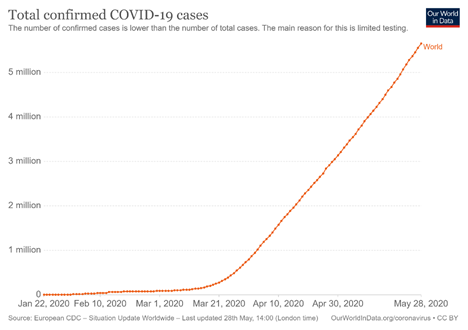COVID-19 Still Needs Data-driven Decisions
By Ron Lear, Director of IP Development and Architect of CMMI Product and Services at ISACA
Effectively gathering, using, storing and archiving data have become major concerns in all industries. Timely and trustworthy data are critical for effective decision-making since the new coronavirus continues to spread. As of this writing, the total number of confirmed COVID-19 cases in the world is
more than 5 million, according to
Our World in Data, which reports and visualizes data from the European Centre for Disease Prevention and Control (ECDC).

“Another important factor in collecting reliable data on the new coronavirus is the physical act of diagnosing a case,” said Jim Halcomb, president of Elucidate Consulting LLC. “To obtain accurate results, health professionals administering the test need time and experience. Otherwise they may miss people who are actually sick and get a false negative.”
There are also a variety of ways to look at the data. While ECDC does provide figures on the daily number of confirmed COVID-19 cases, it recommends looking at the weekly changes, too, because daily data refer to the number of new cases
reported on that day, not
confirmed on that day. Looking at a weekly change provides a clearer representation of locations globally where the pandemic is accelerating, slowing or even reducing.
Experts base decisions and recommendations on the data and the trends that they reveal. A widely discussed issue lately is how to continue to allow businesses, public areas and other places to operate safely now that most are reopened or in the process of reopening? Will physical distancing, clear plastic shields and wearing masks be continued? What will the new normal be? Decisions such as these should be driven by the most timely and reliable data. At the heart of making effective and valid decisions: data quality.
The US Centers for Disease Control and Prevention (CDC), which is proactively addressing the global outbreak of COVID-19, is also using data to monitor the intensity and change of the virus; understand the spectrum of severity and risk factors; and forecast spread and impact.
To help professionals and the public better grasp these activities, the CDC provides a COVID
Data Tracker web site that is updated daily and allows users to interact with a variety of data on COVID-19. The agency also provides a new weekly COVID-19 surveillance report,
COVIDView, which summarizes and interprets key indicators, including COVID-19 outpatient visits, emergency department visits, hospitalizations, deaths and laboratory data.
All of these data sets need to be governed and managed as an asset. ISACA’s CMMI
Data Management Maturity Model (DMM) enables enterprises to support and improve data management practices across the full spectrum of their business. This is especially important in times of fast-moving change and uncertainty, which is happening today.
The DMM provides a structured and standard framework of practices to help organizations pinpoint strengths and gaps, create a unified strategy, build transparency and improve the quality of their data. The model can help organizations become more data secure by providing best practices for a robust data management strategy and data governance approach to more effectively identify what level of security each data type needs.
“Last January no one had a report that showed how the virus was spreading and who in our population was at most risk,” said Halcomb. “Now that we have more data, it would be beneficial to apply DMM principles to the growing volume and complexity of data help ensure we know how to best allocate global and national resources and forge our way forward.”